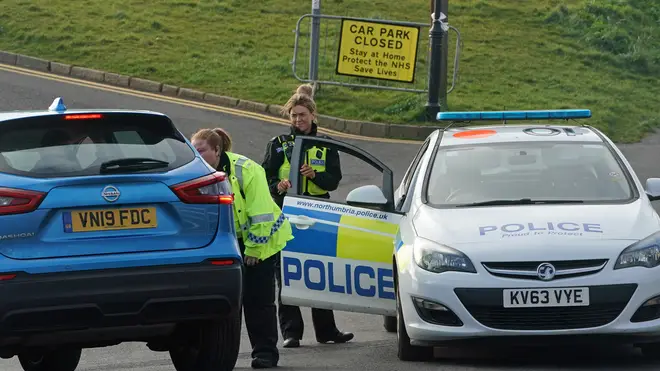
Tom Swarbrick 4pm - 6pm
31 March 2020, 08:27 | Updated: 7 June 2023, 08:56

West Midlands Police chief constable Dave Thompson said arguments that Britain was becoming a "police state" due to the coronavirus restrictions were "widely off the mark".
Police have faced allegations of "over-zealous" policing of the Government's social distancing regulations, while one Minister has told reporters there have been "one or two instances" of police being heavy-handed.
Complaints have included that people have been fined £60 for going out to buy items deemed non-essential, or for going on a drive due to boredom.
Read more: Can I drive during the UK coronavirus lockdown?
In a series of tweets, the highest-ranked police officer in the West Midlands said: "Last week the Prime Minister asked the public to modify their behaviour as part of #StayHomeSaveLives. This was urgent and policing acted to support without laws to do it til Friday. The laws do not cover all the gov advice.
"This public were looking for support from the police all last week. They are calling us re breaches of advice that are not within the law. Officers and staff are doing their best and the public are following the advice. The use of powers is minimal.
"There have been a small number of cases I have seen where I think this could have been done differently. However comments re police state are widely off the mark. Time to be supporting the police as staff are doing a marvellous job in difficult circs."
Read more: Prime Minister Boris Johnson tests positive for Covid-19
Read more: How does the coronavirus home testing kit work and when can I buy one?
But Transport Secretary Grant Shapps said there had been "one or two instances" of police being heavy handed with enforcement measures on social distancing and staying at home, but said, in the main, forces were being "sensible".
He told the BBC: "I think the police are doing a difficult job.
"There will be one or two instances where they have perhaps not approached it in the right way but in general, actually, across the country not only are people complying very well but, generally speaking, the police are taking a very sensible approach to it."
Read more: Are the police stopping people who go outside during the Covid-19 lockdown?
Asked why the National Police Chiefs' Council had thought it necessary to call for consistent guidelines to be followed, Mr Shapps said there had been issues that the police were trying to iron out.
"I think there are, if I may describe them as such, teething problems or the police trying to work out which is the most effective and best approach," he added.
"I will leave that to the police. That letter sounds sensible to try and introduce a degree of consistency.
"Again, I think everyone is on the side of trying to get on top of this thing and you do that by staying home, and, of course, the police can help by applying those rules consistently."
Read more: Coronavirus symptoms - What are they and what is the risk of Covid-19 in the UK?
The National Police Chiefs Council told LBC News the Government has been clear that it "expects people to do the right thing in order to protect the NHS and save lives."
Read more: Coronavirus: Beard sanitiser sales spike after NHS urged staff to shave
A spokesperson said: "Forces will continue to encourage and support local communities to comply fully with these restrictions. We have no desire to use the formal powers now made available to policing, and it’s important to note that the vast majority are following the restrictions. However, it is right that we’re able to enforce against those who disregard these measures and put people at risk."
Currently policing guidance says officers should be "engaging, explaining and encouraging" members of the public to follow the restrictions.
Read more: How long does Covid-19 live on surfaces, and is it safe to get overseas post?
The NPCC said this will include asking whether an individual is aware of the government request; establishing individual circumstances and asking how quickly someone can comply.
"Officers will also explain the risks to public health, and to the NHS in line with government guidance and encourage voluntary compliance," the policing body said.